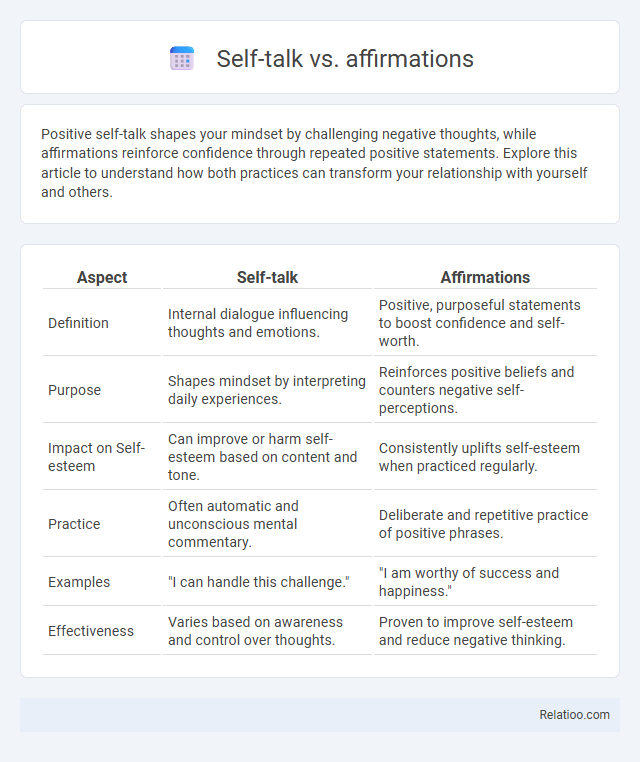Positive self-talk shapes your mindset by challenging negative thoughts, while affirmations reinforce confidence through repeated positive statements. Explore this article to understand how both practices can transform your relationship with yourself and others.
Table of Comparison
| Aspect | Self-talk | Affirmations |
|---|---|---|
| Definition | Internal dialogue influencing thoughts and emotions. | Positive, purposeful statements to boost confidence and self-worth. |
| Purpose | Shapes mindset by interpreting daily experiences. | Reinforces positive beliefs and counters negative self-perceptions. |
| Impact on Self-esteem | Can improve or harm self-esteem based on content and tone. | Consistently uplifts self-esteem when practiced regularly. |
| Practice | Often automatic and unconscious mental commentary. | Deliberate and repetitive practice of positive phrases. |
| Examples | "I can handle this challenge." | "I am worthy of success and happiness." |
| Effectiveness | Varies based on awareness and control over thoughts. | Proven to improve self-esteem and reduce negative thinking. |
Understanding Self-Talk: Definition and Importance
Self-talk is the internal dialogue that shapes your thoughts, emotions, and behaviors, influencing how you perceive and respond to life's challenges. Affirmations are positive, intentional statements designed to replace negative self-talk with empowering beliefs that boost confidence and motivation. Understanding self-talk is crucial because it forms the foundation for mental well-being, directly impacting your self-esteem and overall mindset.
What Are Affirmations? A Clear Overview
Affirmations are positive, specific statements designed to challenge and overcome negative thoughts by encouraging a confident and optimistic mindset. Unlike general self-talk, which includes all internal dialogue, affirmations intentionally focus on reinforcing desired beliefs and goals through repeated, constructive phrases. These positive declarations help reprogram the subconscious mind, enhancing motivation, self-esteem, and overall mental resilience.
Key Differences Between Self-Talk and Affirmations
Self-talk involves the internal dialogue individuals use to process thoughts, emotions, and experiences, often reflecting spontaneous and evolving mental narratives. Affirmations are deliberately crafted, positive statements aimed at challenging and replacing negative beliefs to boost confidence and motivation. The key difference lies in self-talk's broad, natural quality versus affirmations' intentional, constructive purpose to influence mindset and behavior.
Psychological Effects of Self-Talk
Self-talk involves the internal dialogue that shapes thought patterns and emotional responses, impacting motivation and stress levels through either positive or negative reinforcement. Affirmations are structured, repetitive positive statements designed to reprogram subconscious beliefs and enhance self-esteem, often used as a therapeutic tool to combat anxiety and depression. Unlike general self-talk, affirmations target specific cognitive schemas, offering measurable psychological benefits such as reduced cortisol levels and improved mood regulation.
The Science Behind Affirmations
Affirmations leverage neuroplasticity by repeatedly activating positive neural pathways, which can rewire the brain to support improved self-belief and emotional resilience. Self-talk, whether positive or negative, influences cognitive appraisals and behavioral responses, impacting motivation and stress management. Scientific studies demonstrate that consistent, specific affirmations enhance performance and reduce anxiety by engaging the brain's reward circuitry and reinforcing adaptive thought patterns.
How Self-Talk Influences Mindset
Self-talk, the internal dialogue shaping your perceptions and attitudes, significantly influences your mindset by reinforcing beliefs and emotional states. Unlike affirmations, which are deliberate positive statements designed to reprogram your subconscious, self-talk occurs naturally and can either empower or undermine your confidence and motivation. Understanding and consciously managing your self-talk helps cultivate a growth mindset, enhancing resilience and overall mental well-being.
Benefits of Practicing Positive Affirmations
Practicing positive affirmations boosts your self-esteem, enhances mental clarity, and promotes emotional resilience by consistently reinforcing empowering beliefs. Unlike casual self-talk, affirmations are intentional, structured phrases that target your subconscious mind to foster lasting positive change. Incorporating affirmations into your daily routine helps rewire negative thought patterns, leading to improved motivation and overall well-being.
Common Pitfalls in Self-Talk and Affirmations
Common pitfalls in self-talk include negative or overly critical language that reinforces limiting beliefs, undermining confidence and motivation. Affirmations often fail when they are unrealistic, lack emotional resonance, or are repeatedly recited without genuine belief, leading to cognitive dissonance and decreased effectiveness. Both self-talk and affirmations require consistent, authentic, and contextually relevant practice to foster positive mental conditioning and behavioral change.
Practical Strategies to Improve Self-Talk and Use Affirmations
Improving self-talk involves identifying negative thought patterns and consciously replacing them with constructive, realistic statements to boost confidence and reduce stress. Affirmations should be specific, positive, and repeated consistently to reinforce new neural pathways that support a growth mindset and emotional resilience. Practical strategies include journaling daily affirmations, practicing mindfulness to monitor internal dialogue, and setting reminders to pause and reframe negative self-talk in challenging situations.
Choosing What Works: Self-Talk or Affirmations for Personal Growth
Choosing between self-talk and affirmations involves understanding their distinct impacts on your mindset; self-talk reflects your internal dialogue shaping daily thoughts, while affirmations are deliberate, positive statements aimed at reinforcing specific beliefs. Effective personal growth depends on identifying which method resonates with you--self-talk offers authentic processing of emotions, whereas affirmations boost confidence through repetition of empowering messages. Harnessing the right approach aligns your mental habits with your goals, optimizing motivation and emotional resilience.

Infographic: Self-talk vs Affirmations
 relatioo.com
relatioo.com